Tag: Visual edit |
No edit summary Tag: Visual edit |
||
| Line 40: | Line 40: | ||
|850 MHz (5), 1800 MHz (3), 2300 MHz (40) |
|850 MHz (5), 1800 MHz (3), 2300 MHz (40) |
||
|- |
|- |
||
| − | |'''BSNL''''''MTNL''' |
+ | |'''BSNL''' '''MTNL''' |
|900 MHz, |
|900 MHz, |
||
1800* MHz |
1800* MHz |
||
Revision as of 09:51, 5 August 2020
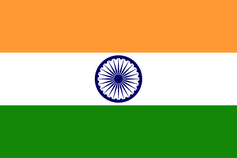
Basics
India has the fastest growing telecom market in the world with more than 1.2 billion subscribers in 2018. It's also one of the most chaotic for foreigners. A lot of operators used to share the market, but after the market entry of a disruptive player (Jio) in 2015/6 a massive wave of consolidation has hit the country 2017-9. Only four groups of providers remain, that are now active nationwide (in all circles):
- Vodafone - Idea: based on the merger of Vodafone and Idea networks
- Bharti Airtel: including acquistions and mergers of Telenor and Tata DoCoMo
- Reliance Jio: started in 2016 on 4G/LTE only (with 2G roaming for voice)
- BSNL and MTNL (the latter in Delhi and Mumbai): state-run providers
Reliance Communications (RCOM) sold its assets and left the mobile market, Telenor did the same, Tata Domoco is still maintained as a separate brand using Airtel's network and Aircel fell into bankruptcy.
Vodafone-Idea has become the new market leader with its two brands, followed by Airtel with the best network and newcomer Jio that leads in mobile broadband with the most data aggressive pricing and a rapidly growing market share, while the two state-run companies remain at a small share of less than 10%.
Although India is an IT country data speed, network stability and voice quality is often bad.
Frequencies and coverage
India is divided into 22 mobile telephone markets called circles mostly along state lines and all licenses are given out per circle. There used to be a considerate fragmentation between circles. Nowadays, through mergers and acquisitions all three private mobile provider groups are operative nationwide in all circles on 2G, 3G and 4G/LTE.
Besides GSM networks, WIMAX and CDMA have been used too, but not part of this survey. CDMA has been shut down and the spectrum is now refarmed to LTE.
| Operator | 2G GSM | 3G UMTS | 4G LTE |
|---|---|---|---|
| Vodafone Idea | 900* MHz,
1800 MHz |
2100 MHz | 1800 MHz (3), 2300# MHz (40), 2500* MHz (41) |
| Airtel | 900* MHz,
1800 MHz |
closing | 1800 MHz (3), 2100 MHz (1), 2300 MHz (40) |
| Jio | n./a. | n./a. | 850 MHz (5), 1800 MHz (3), 2300 MHz (40) |
| BSNL MTNL | 900 MHz,
1800* MHz |
2100* MHz | [2100 MHz (1), 850 MHz (5),
1800* MHz (3), 2500* MHz (41)] [not yet operational in many circles, see article] |
no remark = in all circles, (*) = in most circles, (#) = in few circles. BSNL is active in all circles except Mumbai and Delhi where MTNL operates. 5G is expected to be launched by 2021.
You can never really rely on one network only as blackouts and congestion are frequent. At other times and places, you may also get world class speed and coverage. The Andaman and Nicobar Islands off the coast of India in the Indian Ocean are only covered partly by Airtel's LTE.
According to crowdsourced Open Signal's Mobile Network Experience Report of April 2020 Airtel has continued its domination in data download speeds with 10.1 Mbps of overall 4G and 3G speeds, followed by Vodafone Idea. Despite its leadership in downloads speeds, Airtel hasn't been able to take on Jio on the part of 4G coverage that continued its success with a growth in 4G availability to 98.2% of the population.
Legal requirements
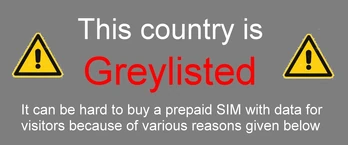
It's not so easy to get a prepaid SIM card in India as a foreigner, you just have to make sure you have all the proper documents and they'll probably want photocopies of them too. These documents you'll probably need:
- make a copy of the photo / name page of your passport,
- a copy of the Indian visa page in your passport (or your OCI card),
- and a passport sized picture as well.
You will need to present these, along with your original passport document, to the SIM vendor.
- Get a proof of where you're staying in India. While for many vendors a visiting card of a hotel may be enough or an hotel reservation. A few may ask for a letter from the front desk verifying that you are indeed staying there.
- If you are staying by private invitation instead, be ready to provide these contact details as the operator may phone your host to verify your data under "Know your Customer" rules.
- If your passport doesn't have a home address, try to show something which looks official with it.
The Indian Government has recently put in restrictions that puts a 3 month limit on prepaid SIM connectivity for foreign visitors to India. In realit,y your SIM card may have validity for 3 months or till the end of the validity of your visa (just a matter of luck)
As of 2012, there has been a significant tightening of regulations around the purchase and activation of SIM cards. Some operators are saying that it will take at least a day to activate a SIM card once purchased. Officially, this process takes now less and in practice, some SIMs are activated within 2 hours since the rule has changed, and other SIMs have taken days to activate. And, just to make things more difficult, there is very little rhyme, reason or logic to how long any of these things take.
From 2019 the porcess mostly takes 24h. For latest reports and updates check this forum.
Because of the legal hassle a travel solution for India with a phone rental including data SIM is added at the end of the chapter. With Trabug you'll pay a heavy surcharge, but can pre-arrange your SIM and can be sure that it will work in the country from the start. However, if you manage to buy and activate a local SIM card instead, you will be rewarded by the lowest data prices in the world.
Availability at airports
Most international airports in India have now counters where you can buy SIM cards provided normally by Airtel, Vodafone-Idea and sometimes others as well. These counters are usually located right after you clear customs. For the most part, if you have the above documents in order, you should be able to get your SIM (still un-activated) in less than 15 minutes after you have filled out the required documentation.
Typical price for an airport SIM is in the range of ₹500-1000 including some airtime and data worth of about ₹250 (as a 2 GB per day plan for 28 days). As the max. sales price for a starter is quite lower, this includes a premium of ₹100-500 for the vendor. Given the confusing registration situation, airport SIMs are generally swifter with registration. An Airtel SIM took only about 1 hour and a verification call in English (which sounded more like Hindi) in 2019.
These airport sellers are more adapted to foreign visitors and their needs with better English than in many downtown shops. The flip side is when you leave the airport, you don't have network connection yet and sometimes have to wait a while. Good sellers give you their contact number in case of problems. But this system has also been subject to fraud. Some airport sellers re-collected SIM cards from exiting visitors just to redistribute them again. This is illegal and should be avoided as visitor SIM cards will be shut off after 2 months. The same applies to reports from tourist locations like Goa, where users needed to pay some extra fees like ₹700 to bypass the paperwork and skip activation time. Better don't accept SIM cards that are already activated and have some patience.
As prices for mobile telephony in India are the lowest in the world, you still pay much less than in many other countries and airports may be a safer or swifter way to get a SIM card. Nevertheless, if you don't get one at the airport, you are still be able to get a prepaid SIM card at a local, independent or branded cellphone dealer downtown often for a slightly lower start-up price. If you have all the documents in order, it will make it much easier for them. There, it normally takes a bit longer for activation that in airports. So better choose a store at a place where you stay for a while to be able to call again in case of problems.
Regional organization
When starting up, be sure to enable (domestic) roaming as the networks are organized on a state (or rather circle) level. Jio started with aggressive pricing in 2016/7 and as a consequence all inter-circle roaming surcharges have been scrapped. All data allowances are now available through all circles nationwide. But still different pricing can apply for purchasing a package according to circle.
Special rules for Jammu and Kashmir state
A prepaid SIM card bought and registered somewhere in India, can be used all over the union, except in Jammu and Kashmir (State of North India) this is because of the fear of terrorism. Only a new prepaid SIM, bought in J&K works in this state. There the restrictions are even higher: you will need 4 passport photos, copies of your passport and your local sponsor (hotel manager or local counterpart) and expect that activation takes even longer. J&K SIM cards have reduced functionality: You can't receive or send text messages and the number of the prepaid subscriber from Jammu and Kashmir won't work outside the state. This restriction has been extended to 2018.
In 2020 authorities in Jammu and Kashmir have begun loosening the restrictions on internet access in the territory, lifting a ban on social media platforms and allowing users to access the internet via 2G mobile data services and fixed line connections at restricted speeds. Telecoms services in the region have been restricted since August 2019 on grounds of ensuring security and public order following the central government’s decision to revoke the territory’s special status. The government has gradually eased restrictions which initially amounted to a virtual communications blackout, restoring mobile telephony in October. It was not until January 2020, however, that authorities began allowing residents to access the internet again, albeit with substantial restrictions. The move followed a Supreme Court ruling in January 2020 that internet access is a fundamental right under the country’s constitution.
Internet shut-downs
India is the country the most frequent shutdowns of the internet in times of crises and political turmoil. The networks in Jammu and Kashmir state lasted for several months and even the national capital of Delhi was affected at the end of 2019. https://internetshutdowns.in/keeps track of the internet disconnection that impose all mobile and landline operators and therefore even roaming customers with a foreign SIM card. So better check the situation in your local state before you buy a SIM card.
List of providers
The following list is divided in the four remaining players on the Indian market according to market share. It only gives you basic information about availability and prices. Only nationwide promotions and plans are listed and often local offers differ price according to region (circle).
So check locally or for a detailed list of all providers, circles and mobile plans check on reload.in or compare plans on komparify.com/operators.
Do not disturb (NCPR) registry
Many Indian SIM card users suffer from a lot of unwanted marketing messages and calls made by the mobile network operators. These messages and calls can be extremely annoying and should better be turned off.
The National Customer Preference Register (NCPR) is intended to give Indian consumers an opportunity to limit or block the telemarketing calls that they receive and is usually referred as the Do Not Disturb (DND) registry.
This process of activating DND/NCPR services is the same for all providers: text 'START 0' to 1909 or call 1909. Check registry status of your phone number here.
Vodafone Idea
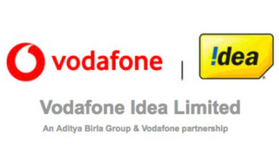
Vodafone Idea Ltd. is now India's largest telecom operator offering 2G, 3G and 4G/LTE mobile services under its two brands named Vodafone and Idea. As of 2018, Vodafone Idea has 38% market share in India with 444 million subscribers, making the largest mobile telecommunications network in India and second largest mobile network in the world.
In August 2018, Vodafone India merged with Idea Cellular, and was renamed as Vodafone Idea Ltd. However, the merged entity will continue using both the Idea and Vodafone brands.
Vodafone Idea Ltd. owns this spectrum in different bands all across the country:
- 2G/GSM is on 900 MHz and/or 1800 MHz in all circles
- 3G/UMTS is on 2100 MHz in all circles
- 4G/LTE is on 1800 MHz (Band 3) in all circles, 2300 MHz (TD-LTE Band 40) in Maharashtra & Goa, Kerala and Madhya Pradesh & Chattisgarh circles only, 2500 MHz (TD-LTE Band 41) in all circles except Karnataka and Tamil Nadu
As of September 2018, Vodafone Idea Ltd offers 4G/LTE services on its own spectrum in all the telecom circles.
In early 2019 Vodafone Idea has announced it has completed the consolidation of nearly 25% of its pan-India radio network integration so far. With this integration, customers of both Vodafone and Idea can now access a unified network on 2G, 3G & 4G, in the service areas of West Bengal, Haryana, HP, Assam, North East, AP & Telangana (excl. Hyderabad), J&K and MP and Chhattisgarh.
Vodafone
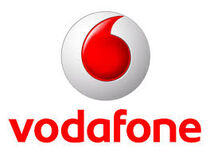
Availability
Their SIM card costs ₹50-100, various vendors may charge whatever they feel like. Recharges are made in their shops or online for a credit of ₹105-1000. The most useful USSD codes to manage a Vodafone SIM can be found here.
Data offers
Default rate outside of packs is on most prepaid tariffs and circles is around 4p per 10 KB. Their rates and package sizes differ very much from circle to circle. So it doesn't make sense to quote local prices here.
- 2G, 3G and 4G/LTE packages: select and circle here on top right
| Recharge | Data | Time | Extras |
|---|---|---|---|
| ₹ 21 | unlimited | 1 hour | |
| ₹ 27 | 500 MB | 28 days | |
| ₹ 33 | unlimited | 1 night | valid 1am - 6am |
| ₹ 46 | 1 GB | 28 days | |
| ₹ 48 | 3 GB | 24 hours | |
| ₹ 92 | 6 GB | 7 days | |
| ₹ 199 | 1.4 GB/day | 28 days | * |
| ₹ 209 | 1.5 GB/day | 28 days | * |
| ₹ 255 | 2 GB/day | 28 days | * |
| ₹ 349 | 3 GB/day | 28 days | * |
| ₹ 399 | 1.4 GB/day | 70 days | * |
| ₹ 458 | 1.4 GB/day | 84 days | * |
| ₹ 479 | 1.5 GB/day | 84 days | * |
| ₹ 509 | 1.4 GB/day | 90 days | * |
| ₹ 511 | 2 GB/day | 84 days | * |
| ₹ 529 | 1.5 GB/day | 90 days | * |
| ₹ 549 | 3.5 GB/day | 28 days | * |
| ₹ 569 | 3 GB/day | 84 days | * |
| ₹ 799 | 4.5 GB/day | 28 days | * |
overuse fee is ₹0.04 per 10 KB.
(*) = all these packs come with unlimited local, STD & national roaming calls, 100 SMS/day
International roaming offers
Vodafone has the best international roaming offer in the Indian market called iRoam Free. These roaming plans come in different time frames between 1 day at ₹500 and 30 days at ₹5000 (for full list see here). These packages are valid in 40 countries. In the USA, Singapore and UAE calls and data, both incoming and outgoing while travelling in these countries are completely surcharge free. In 37 further countries: France, Germany, Italy, Ireland, Spain, Greece, Switzerland, Singapore, Australia, Hong Kong, Thailand, Malaysia, Turkey, Belgium, Netherlands, Norway, Denmark, Czech Republic, Portugal, Romania, Albania, Hungary, Luxembourg, Canada, Saudi Arabia, Oman, Qatar, Kuwait, Sri Lanka, New Zealand, Japan, Korea, Russia, Taiwan, Mauritius, and Morocco all incoming calls are free, and data plus outgoing calls being nominally charged at ₹1 per MB and₹ 1 per minute respectively.
More info
- APN: www
- Website: http://www.vodafone.in
Idea
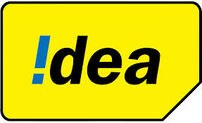
Availability
SIM card costs ₹10 + ₹1.10 tax, various vendors may charge whatever they feel like. Default data rate is around ₹0.03 per 10 KB. For USSD codes that can be used to manage your SIM, check here.
Data offers
Idea has competitive prices for packages, similar to Airtel or Vodafone. However, their prices differ widely according to state/circle.
For offers check their website and select circle. These following promotions are valid nationwide, have been harmonized with Vodafone and offered in 2018/9:
| Recharge | Data | Time | Extras |
|---|---|---|---|
| ₹ 28 | 500 MB | 28 days | |
| ₹ 45 | 1 GB | 28 days | |
| ₹ 98 | 3 GB | 28 days | |
| ₹ 179 | 1 GB/day | 28 days | * |
| ₹ 199 | 1.4 GB/day | 28 days | * |
| ₹ 249 | 2 GB/day | 28 days | * |
| ₹ 349 | 3 GB/day | 28 days | * |
| ₹ 398 | 1.4 GB/day | 70 days | * |
| ₹ 459 | 1.4 GB/day | 84 days | * |
| ₹ 499 | 2 GB/day | 82 days | * |
| ₹ 509 | 1.4 GB/day | 90 days | * |
| ₹ 511 | 2 GB/day | 84 days | * |
| ₹ 529 | 1.5 GB/day | 90 days | * |
| ₹ 549 | 3.5 GB/day | 28 days | * |
| ₹ 569 | 3 GB/day | 84 days | * |
| ₹ 799 | 4.5 GB/day | 28 days | * |
overuse fee is ₹0.04 per 10 KB.
(*) = all these packs come with unlimited local, STD & national roaming calls, 100 SMS/day
More info
- APN: internet
- Website: http://www.ideacellular.com
Airtel (Bharti Airtel)
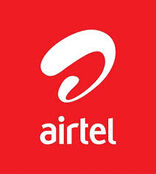
Airtel India (a.k.a. as Bharti Airtel) used to be the biggest provider in India and is now the second largest provider of mobile telephony in the country with about 344.55 million wireless subscribers in India or about 30% of the market. This comes through mergers and acquisitions of other providers like Telenor. The latest merger with Tata Docomo is expected was finished in July 2019 giving another 40 million customers to the new group.
The Airtel group owns this spectrum in different bands all across the country:
- 2G/GSM is on 900 MHz and/or 1800 MHz in all circles,
- 3G/UMTS is on 900 and 2100 MHz in most circles (being switched off, see below),
- 4G/LTE is on 1800 MHz (Band 3) in all circles and 2300 MHz (TD-LTE Band 40) in all circles
Airtel customers can use 4G/LTE services on own spectrum in all the telecom circles.
3G switch off
In 2019 Airtel has begun switching off its 3G network to refarm the spectrum for 4G services. The first stage of the phase-out has taken place in Kolkata, where the telco has deactivated its 3G platform and plans to use the 900 MHz frequency to strengthen indoor coverage of their 4G network in the circle. They plan to refarm all of the 3G spectrum across India and deploy it for 4G and 5G in a phased manner while they intend to continue operating their 2G network. This shut-off and transition is expected to be completed in 2020. For data you will need a 4G or 5G device on Airtel now.
Availability
An Airtel SIM card costs ₹50-100, some vendors may charge more. Swapping a 3G SIM to a 4G SIM is free.
Activation takes usually around 24h. 3G/4G activation takes up another four hours after intial SIM card activation. When you buy the card, initially you will have no network; after some hours, you'll notice network availability; call 59059 to activate. You'll need to give the last four digits of your ID.
Any Airtel number may be released, if not logged into the network for 30 days. Balance check: *121*2#. Click here for many other useful codes.
Data offers
Default data depending on prepaid tariff line and region and is mostly around ₹0.04 per 10 KB.
Airtel always offers promotions for new customers and their first time recharge. So ask for it. Afterwards 3G/4G data "normal" recharge price applies and they differ between circles. There are no manual activations as such, once the credit is added the data package is activated automatically, with a SMS notification. So every top-up correspondents with a certain allowance. Be sure to top-up the right amount exactly to get the right bundle.
Note that their plans might slightly differ according to circle. These plans are given out for 2G/3G and 4G/LTE:
| Recharge | Data | Time | Extras |
|---|---|---|---|
| ₹ 9 | 100 MB | 1 day | |
| ₹ 29 | 520 MB | 28 days | |
| ₹ 48 | 1 GB | 28 days | |
| ₹ 49 | 3 GB | 24 hours | |
| ₹ 59 | 500 MB | 7 days | * |
| ₹ 92 | 6 GB | 7 days | |
| ₹ 98 | 3 GB | 28 days | |
| ₹ 99 | 1 GB | 10 days | * |
| ₹ 119 | 1 GB | 14 days | * |
| ₹ 159 | 1 GB | 21 days | * |
| ₹ 175 | 6 GB | 28 days | |
| ₹ 199 | 1.4 GB/day | 28 days | * |
| ₹ 245 | 2 GB/day | 28 days | * |
| ₹ 289 | 1 GB/day | 48 days | * |
| ₹ 349 | 3 GB/day | 28 days | * |
| ₹ 399 | 1.4 GB/day | 70 days | * |
| ₹ 448 | 1.4 GB/day | 82 days | * |
| ₹ 449 | 2 GB/day | 70 days | * |
| ₹ 495 | 1.4 GB/day | 84 days | * |
| ₹ 499 | 2 GB/day | 82 days | * |
| ₹ 509 | 1.4 GB/day | 90 days | * |
| ₹ 558 | 3 GB/day | 82 days | * |
overuse fee is ₹0.04 per 10 KB
(*) = to these plans unlimited local, STD and national roaming calls along with 100 SMS per day are added.
To apply a feature data pack, you can ask at any shop showing the Airtel logo, which are very widespread. Contrary to most countries, don't just buy the airtime - you need to buy and apply data packs separately.
There are lots of special offers, and data packs can be shared with up to five 'family' members. It's worth downloading the My Airtel app to see all offers and easily apply them; this is only available in the Indian App and Play stores, but how to install it on a device from outside is shown here.
Domestic roaming has to be switched on to use internet out of the state you've purchased the SIM from. There are no extra charges for this domestic data roaming, but for roaming and STD calls from there extra charges remain.
More info
- APN: airtelgprs.com
- Website in English: http://www.airtel.in/
Jio
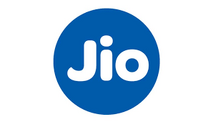
Reliance Jio Infocomm Limited (RJIL), the mobile arm of petrochemical giant Reliance Industries Ltd. (RIL) owned by India's richest man Mukesh Ambani, started its new 4G-only network at the end of 2015 nationwide.
In 2019 people say it's not fast because there are probably too many customers for the network, because of it's aggresive price strategy.
History
In 2016 RJIL started a price war with their new 4G/LTE network. The operator currently covers more than 90% of the population with 4G/LTE in all circles. It has twice as many towers for 4G than its competitors and has become the broadband market leader in India. But on Jio, there is no fallback to 2G or 3G. For voice there is supposed to be free roaming through the network of BSNL (see below, not in Mumbai and Delhi) thanks to an inter-circle agreement between Jio and BSNL. This seems not to be implemented in all circles so far. You need a VoLTE device or their JIO app to place voice calls.
Jio has only own 4G/LTE access to 850 MHz (Band 5) in 10 circles, 1800 MHz (Band 3) spectrum in about 6 circles and 2300 MHz spectrum (TD-LTE Band 40) in all 22 circles. They claim to have double average speed with 16 Mbps compared to their competitors, but OpenSignal tests proved otherwise and showed in fact slower speeds than Airtel and Vodafone Idea.
The start
Under it's welcome offer, all Jio services including voice, apps, and 4G/LTE data were available for free until March 2017 (up to 4 GB per day). It has been the fastest growing technology firm with 100 million customers gained in just 170 days, that's 7 customers per second.
Up to 2018 Jio has reached a market share of more 230 million users or 20% of all subscribers in the country. Jio announced that it would be adding to its more than 100,000 LTE tower sites another 100,000 new sites by the end of the year, targeting a mobile 4G/LTE coverage of 95% of the population.
Availability
As their SIM cards are still in high demand, expect delays and problems like overcrowding of their network. Jio faced a blockade of the other carriers e.g. through interconnection issues with the other networks. Jio claims a call failure rate of 175 calls per 1000 calls due to anti-competitive behavior of the other providers. In 2017 their data download rates which were unreliable at first, but now seemed to have stabilized nationwide.
Top-up vouchers are sold from ₹10-5,000 or top-up online. The best way to monitor your consumption is to install their MyJio app.
Data plans
Reliance Jio, which claims to be the world's largest mobile data network, continues to bring about paradigm shifts in the Indian telecom market. Jio has launched new plans to ensure customers get the best deals:
All of these plans require a Jio Prime membership for ₹99 per year. They include free calls (VoLTE-only or BSNL roaming) local, STD and roaming, free SMS to all operators and a data quota and "unlimited" data regulated by a daily quota:
| Recharge | Time | Total Data | FUP per day |
|---|---|---|---|
| ₹ 19 | 1 day | 150 MB | 150 MB |
| ₹ 52 | 7 days | 1.05 GB | 150 MB/day |
| ₹ 98 | 28 days | 2 GB | |
| ₹ 149 | 28 days | 42 GB | 1.5 GB/day |
| ₹ 198 | 28 days | 56 GB | 2 GB/day |
| ₹ 251 | 51 days | 102 GB | |
| ₹ 299 | 28 days | 84 GB | 3 GB/day |
| ₹ 349 | 70 days | 105 GB | 1.5 GB/day |
| ₹ 398 | 70 days | 140 GB | 2 GB/day |
| ₹ 399 | 84 days | 126 GB | 1.5 GB/day |
| ₹ 448 | 84 days | 168 GB | 2 GB/day |
| ₹ 449 | 91 days | 136 GB | 1.5 GB/day |
| ₹ 498 | 91 days | 182 GB | 2 GB/day |
| ₹ 509 | 28 days | 112 GB | 4 GB/day |
| ₹ 799 | 28 days | 140 GB | 5 GB/day |
| ₹ 999 | 90 days | 60 GB | |
| ₹ 1699 | 365 days | 547.5 GB | 1.5 GB/day |
| ₹ 1999 | 180 days | 125 GB | |
| ₹ 4999 | 360 days | 350 GB | |
| ₹ 9999 | 360 days | 750 GB |
Prices are the same in all circles. Exceeding the FUP, speed will be throttled to 128 kbps.
More info
- APN: jionet
- Website: http://www.jio.com
BSNL and MTNL (state-owned, formerly known as CellOne)
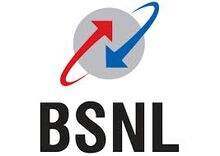
Both state-owned mobile providers in India are notoriously cash-stricken and known for their unreliable service. They also offer landlines and other phone products. 4G/LTE is starting with BSNL and still not on the air from MTNL. BSNL operates in all circles except in Delhi and Mumbai, where MTNL operates. A merger of the two companies is expected for some time now, but has not happened so far.
BSNL
BSNL for Bharat Sanchar Nigam Limited was formerly branded as CellOne and is still displayed in many mobiles this way. It's an Indian state-owned telecommunications company and operates in all circles except the cities of Mumbai and New Delhi where MTNL operates instead (see below).
BSNL owns spectrum across the country except of Mumbai and Delhi. 2G/GSM is on 900 MHz and 1800 MHz, 3G on 2100 MHz and 4G/LTE is in trials in some circles and soon to be launched on 850 MHz (Band 5), 1800 MHz (Band 3) and 2500 MHZ (TD-Band 41).
Availability
They sell a prepaid data SIM with voice for ₹20 with a ₹96 voucher as a regular SIM or for Rs. 59 as a USIM. This includes 500 MB valid for 30 days.
For SIM card management, check out these USSD codes.
Data options
State-owned telco BSNL is not aloof from the ongoing battle among the private industry players either. These packages can be activated for 2G and 3G, check here.
More info
- APN: bsnlnet
- Website: http://www.bsnl.co.in/
MTNL
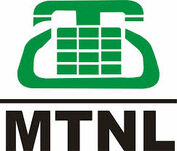
MTNL for Mahanagar Telephone Nigam Ltd. is the other state-owned telecommunications service provider in the metro cities of Mumbai and New Delhi. They operate only there and in two different branches for Mumbai and Delhi. It's expected that they will be merged with BSNL in the future. Note that they don't offer 4G/LTE yet, but have requested spectrum for a launch soon. That's why they may be not so convenient for travelers and are mentioned only shortly.
MTNL in Mumbai
MTNL sells a broad and quite cheap variety of 2G/3G data packs for Mumbai only: check data-packs
MTNL in New Delhi
Likewise, MTNL sells similar very cheap 2G/3G data packs in Delhi only, check here and tick data plans and change to prepaid.
More info
- APN for Mumbai and Delhi: mtnl.net
- Website MTNL Mumbai: http://mtnlmumbai.in
- Website MTNL New Delhi: http://mtnldelhi.in
Trabug
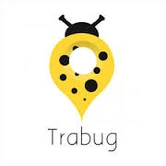
Because of the legal hassle to get a SIM card (see Basics) a travel solution for India with a phone or WiFi hotspot rental including a local SIM is offered with Trabug. You'll pay a heavy surcharge for their service, but can pre-arrange your SIM before travel and can be sure that it will work in the country from the start.
Trabug was launched in 2016 by a small team of tech professionals in the North Indian town of Panchkula. They rent out smartphones and WiFi hotspots powered by a 4G/LTE SIM card to foreign tourists. The Android phone. WiFi hotspot and operators are not specified, but will have 4G/LTE access where covered. It additionally includes a travel guide.
Rental
You have to order online on their website. Though you still have to send all the required documents (see Basics) to them when ordering, but Trabug will do the arrangements for you. Once the traveller arrives in India and receives the kit, all he/she has to do is activate the SIM card, by following a simple set of instructions. They charge US$ 9.99 for shipping, if the rental bill is below US$ 50.
For returning the phone or mifi to the company the user needs to place it in a pre-supplied box, leave it at the hotel reception or place of stay, and the company will have it collected.
Rates
The product must be ordered and payed in advance online by credit card or PayPal.
- Android phone rental: including 1.2 GB 4G data, 120 mins nationwide calling and 5 SMS at US$ 3.99 per day
- WiFi Hotspot rental: including 1.2 GB 4G data and a router that connects up to 5 devices at US$ 2.49 per day
All incoming calls and SMS are free. Due to government regulations, plans can not be longer than 80 days. There is a refundable security deposit of US$ 65 charged before shipping, which is refunded within 10 working days after returning the device.
More info
- Website: http://www.trabug.com/
- Facebook and Twitter: Hellotrabug
